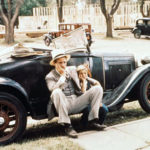
When the 9-11 anniversary passed, I was going to write something to the effect of get over it, but I was too cowardly, because much like when Gilbert Gottfried got shot down with a “too soon” back at a roast of Hugh Hefner, people still go insane over this topic as if they’re entire family had been in the buildings.
I’m not really proud to admit this, but when it all went down I was in Chicago and I called a friend on the West Coast and left an Alec Baldwin worthy message (although, I was kind of giggling not angry) that went something to the effect of “Dude you have to wake up the world is coming to an end!” Not the most mature response.
Anyway, I will take credit that when I talked it over with my best friend later in the day, I was more cogent. I predicted that conservatives would jump all over the thing, we’d invade Iraq and human liberties would take about a 30 year holiday.
Feel free not to believe me, but if I was going to lie would I have owned up to giggling,”Dude you have to wake up the world is coming to an end!”?
Anyway, I pussied out, even though I really wanted to mock the fact that some local chicken joint was planning on giving free sandwiches to firemen that day, because you know if Cleveland firefighters have to pay for their own food the terrorists win.
Prowling the internet today I found this David Foster Wallace essay that echoes my views on the whole thing, which is noteworthy partly because he just killed himself (on 9-12, when you off yourself it’s best to do it on a free date – I’m guessing that Darby Crash would have waited a week had he have known that John Lennon was going to get shot right after he killed himself) and also because I immediately realized that Bill Maher quoted or stole the 40,000 vehicular deaths line on his HBO show that I watched last night.
The Future of the American Idea
November 2007
Atlantic Monthly
by David Foster Wallace
Just Asking
Are some things still worth dying for? Is the American idea* one such thing? Are you up for a thought experiment? What if we chose to regard the 2,973 innocents killed in the atrocities of 9/11 not as victims but as democratic martyrs, “sacrifices on the altar of freedom”?* In other words, what if we decided that a certain baseline vulnerability to terrorism is part of the price of the American idea? And, thus, that ours is a generation of Americans called to make great sacrifices in order to preserve our democratic way of life—sacrifices not just of our soldiers and money but of our personal safety and comfort?
In still other words, what if we chose to accept the fact that every few years, despite all reasonable precautions, some hundreds or thousands of us may die in the sort of ghastly terrorist attack that a democratic republic cannot 100-percent protect itself from without subverting the very principles that make it worth protecting?
Is this thought experiment monstrous? Would it be monstrous to refer to the 40,000-plus domestic highway deaths we accept each year because the mobility and autonomy of the car are evidently worth that high price? Is monstrousness why no serious public figure now will speak of the delusory trade-off of liberty for safety that Ben Franklin warned about more than 200 years ago? What exactly has changed between Franklin’s time and ours? Why now can we not have a serious national conversation about sacrifice, the inevitability of sacrifice—either of (a) some portion of safety or (b) some portion of the rights and protections that make the American idea so incalculably precious?
In the absence of such a conversation, can we trust our elected leaders to value and protect the American idea as they act to secure the homeland? What are the effects on the American idea of Guantánamo, Abu Ghraib, Patriot Acts I and II, warrantless surveillance, Executive Order 13233, corporate contractors performing military functions, the Military Commissions Act, NSPD 51, etc., etc.? Assume for a moment that some of these measures really have helped make our persons and property safer—are they worth it? Where and when was the public debate on whether they’re worth it? Was there no such debate because we’re not capable of having or demanding one? Why not? Have we actually become so selfish and scared that we don’t even want to consider whether some things trump safety? What kind of future does that augur?
FOOTNOTES:
1. Given the strict Gramm-Rudmanesque space limit here, let’s just please all agree that we generally know what this term connotes—an open society, consent of the governed, enumerated powers, Federalist 10, pluralism, due process, transparency … the whole democratic roil.
2. (This phrase is Lincoln’s, more or less)






